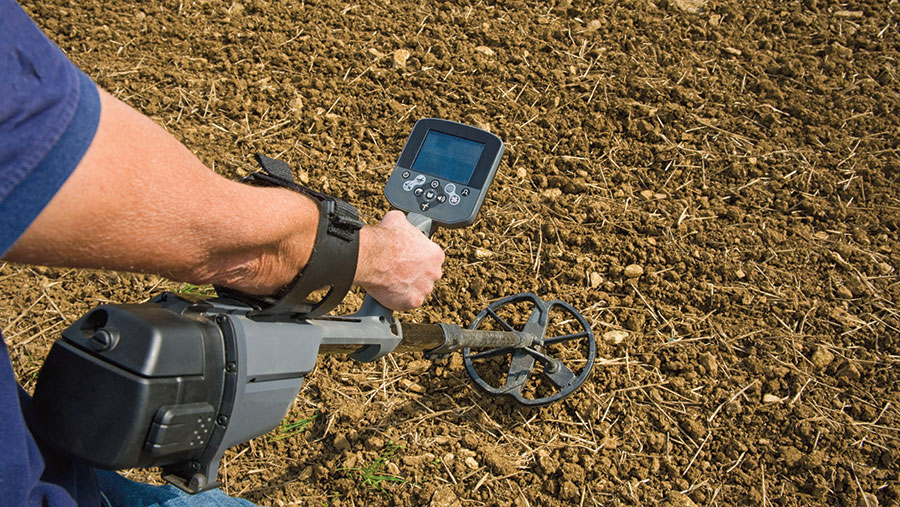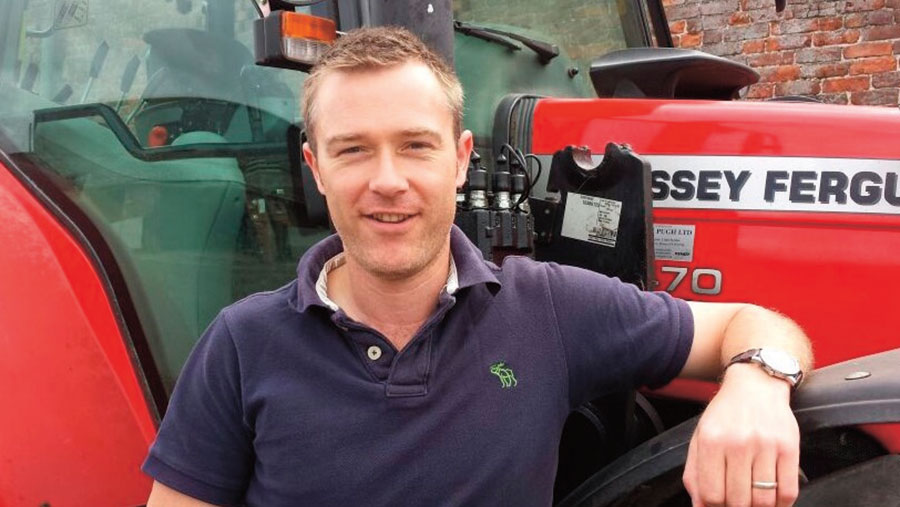Metal detectorists on your land – what farmers need to know
 © Mint Images/REX/Shutterstock
© Mint Images/REX/Shutterstock The recent discovery of a haul of Iron Age jewellery on farmland in Staffordshire could make the hobby of metal detecting more popular than ever.
It’s a leisure pursuit with a reputation of being for loners and geeks, but there’s no denying the growing popularity of metal detecting.
Every weekend thousands of enthusiasts flock to beaches and farmland up and down the country in the hope they will find buried treasure.
According to a recent study by Historic Environment Scotland, they are motivated by an interest in history and a desire to find out more about the past.
But there’s also the allure of finding something of value – like the Staffordshire Hoard, which was unearthed in 2009 and was eventually jointly purchased by a museum and gallery for £3.285m.
A collection of gold jewellery, which could date back to 400BC, was also unearthed on a dairy farm in Staffordshire just before Christmas.
Here is some advice for farmers in case they are approached by a metal detectorist wishing to access their land.
What are the advantages of allowing detectorists on to your farm?
One of the biggest benefits is that it is an opportunity to find out more about the history of the land you own, because detectorists will find things that otherwise might not be found, says Andrew Gillett, legal adviser at the CLA.
The presence of people around the farm may also discourage other trespassers, including fly-tippers, as well as provide an extra pair of eyes to keep watch for sick or straying livestock.
See also: Why the CIL planning tax is costing farmers thousands
Detectorists can also provide a useful service in clearing away unwanted bits of rubbish that might cause problems if ingested by an animal.
Although farmers can charge people for access, generally any payment is very small, says Crispin Mahony, director of Savills estate management.
“However, some landowners allow rallies to take place with a set donation per person going to a charity, which can be positive.”
Sounds great – are there any cons?
One possible downside is that if you allow one or two people access to your land then others can follow, warns Mr Mahony.
“Occasionally you can get problems with unauthorised access by detectorists and that can be where they have seen people in the field with permission and others have decided it means they can do the same.”
Do detectorists need permission?
Metal detectorists must obtain the landowner’s permission to enter private land and anyone searching without permission is committing trespass, says Mr Gillett.
A tenant will need to clear any permissions with their landlord first and failure to do so may put them in breach of their tenancy agreement.
Some tenancies (particularly Farm Business Tenancies) expressly exclude the tenant granting consent for metal detecting.
Should you have an agreement in place?
It is advisable that landowners have a written ‘finds agreement’ before allowing anyone to go out detecting, says Mr Mahony.
A template can be downloaded from the website of the National Council for Metal Detecting but this will need to be edited to suit your own situation and any specific conditions.
“The agreement needs to cover who has permission, what they can and cannot do – such as driving on fields – and how deep they can dig for finds (usually no deeper than plough depth without the landowner’s consent).
“It should also cover what is expected in terms of reporting any finds and the reinstatement afterwards,” he says.
See also: Business Clinic: Options to resolve field boundary disagreement
Other considerations include what happens to any objects found that fall outside of the definition of treasure (see below).
By law these belong to the landowner, who may retain or dispose of them as they wish, so it is worth specifying in the agreement if you want to see all objects found in order to make a decision about their future.
Common finds on farmland reflect its agricultural history and often include horseshoes, buckles, buttons and coins, along with more modern artefacts such as shear bolts and plough points.
Should you restrict access areas and times?
Mr Mahony says it is important to consider the practicalities of arranging access – such as insisting you are informed before anyone arrives on the farm.
This allows the farmer to let the detectorist know if there are specific areas that should be avoided. This could be particularly important if also allowing people to shoot over the land.
The agreement should also include a map with areas that should not be accessed marked on it, he says.
It is illegal to use a metal detector on a Scheduled Monument or Site of Special Scientific Interest without the permission of Natural England or the equivalent authority.
The rules in Scotland
The Treasure Act (1996) does not apply in Scotland.
In Scotland, any ownerless objects found through metal detecting become the property of the Crown.
This means that if anyone finds something of archaeological significance in Scotland, they are obliged by law to report it to Treasure Trove.
There is a dedicated Treasure Trove Unit. Further details can be found at Treasure Trove Scotland.
If any treasure is found, what happens?
The Treasure Act 1996 Code of Practice (which applies in England and Wales) starts from a presumption that the landowner and the finder will split the reward on a 50:50 basis, says Mr Gillett.
However, parties can agree a different split and the Secretary of State will be prepared to apportion the reward with reference to an agreement.
If you only have a verbal agreement of a different split then it is almost impossible to prove it in the event of something that is classified as treasure being found, warns Mr Mahony.
This means you may have to go with the usual convention on sharing the reward equally between the finder and the landowner.
Is everything classed as treasure?
Under the Treasure Act 1996, finders of potential treasure have a legal obligation to report such findings to the coroner within 14 days. Once reported, the coroner holds an inquest to rule whether it is treasure.
Finds that must be reported to the coroner include all discoveries of gold and silver objects and groups of coins that are over 300 years old. A group of prehistoric base-metal objects found in the same place also qualify as treasure.
If a find is ruled to be treasure by the coroner, then museums are given the opportunity to acquire it with the valuation made by the Treasure Valuation Committee.
The non-reporting of treasure is illegal and carries a maximum penalty of imprisonment for three months and/or a fine of up to £5,000.
The British Museum monitors eBay and elsewhere for unreported treasure and liaises with the police as appropriate.
What can you do if metal detectorists trespass on your land?
Trespassing is generally a civil matter rather than a criminal one, says Mr Gillett. The landowner should simply request the individual to leave and in most situations this will resolve the issue.
“If the same individual is persistently trespassing it is best to be accompanied by a friend or employee when asking them to leave and to make a note of any vehicle registration and any damage to property.
“This information is invaluable if you need to take the matter further. Criminal offences may be committed in certain circumstances, for example, metal detecting and removing objects from a Scheduled Monument.
“Likewise, taking objects from land without the landowner’s permission may amount to theft. Often done under cover of darkness and known as ‘night hawking’. It should be reported to the police.”
What are the insurance implications of allowing metal detecting?
It is advisable to double-check with your insurer that you have adequate insurance to protect against any potential claim, says Mr Gillett.
If permission is granted, then the detectorist will be seen as a visitor for the purposes of the Occupiers’ Liability Act 1957.
But he adds: “Membership of some metal-detecting clubs comes with civil liability insurance and most metal-detecting licences will require the detectorist to prove that they are adequately insured.”
Metal detecting – a farmer’s experience

A fascination with history is the main motivation for Will Evans to allow metal detecting on his farm.
Mr Evans, a beef, arable and poultry producer who farms near Wrexham, grew up with the practice – he recalls that two elderly gentlemen regularly came detecting when he was a child.
He only gives permission to one or two people at a time and always asks that they notify him before they come. Access is limited to stubble fields or land just after the plough has been through.
“We have never had a formal agreement, although I do ask that they show me anything they find as I am interested in the history of the farm,” he says.
“The most interesting item discovered has been one Roman silver coin and there have also been some musket balls and a piece of Anglo-Saxon metalware.
“I let the detectorist keep the coin, although I did ask for first refusal if he was ever to sell it.
“I’ve taken the view that if he hadn’t have found it, then I never would have. Although if he found something valuable then it would change things. Perhaps I should consider some sort of agreement.”
